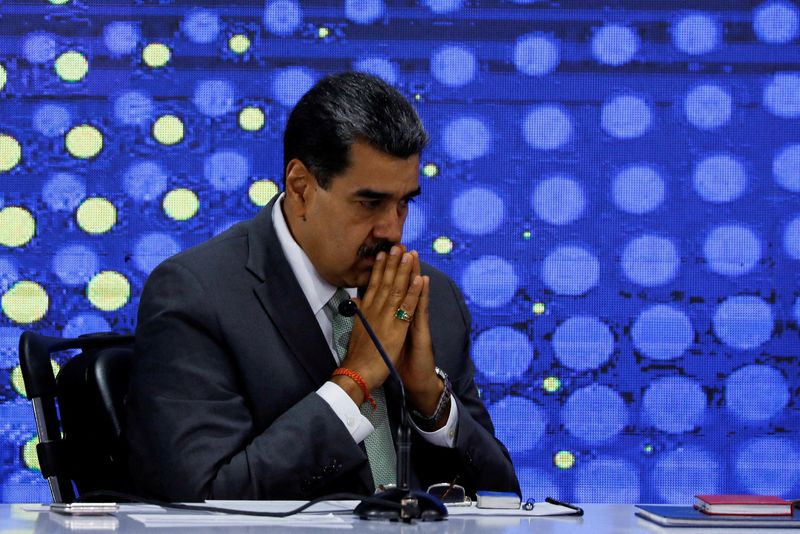By Matt Spetalnick, Daphne Psaledakis and Marianna Parraga
WASHINGTON/HOUSTON (Reuters) – The Biden administration has signaled that it could reimpose oil sanctions on Venezuela on Thursday in response to what U.S. officials see as President Nicolas Maduro’s failure to meet his commitments for free and fair elections this year.
Barring any last-minute concessions by Maduro, the U.S. has made clear it is not likely to renew a six-month license that granted the OPEC member partial sanctions relief from October, following an election deal reached between the government and the Venezuelan opposition. It expires just after midnight EST (0400 GMT on Friday).
Washington had repeatedly threatened in recent months to reinstate punitive measures on Venezuela’s vital oil and gas sector unless Maduro made good on his promises, including allowing the opposition to run the candidate of its choice against him in the July 28 election.
Maduro’s government has complied with some of the terms of the deal, signed in Barbados.
The withdrawal of the most significant element of U.S. sanctions relief would mark a major step back from U.S. President Joe Biden’s policy of re-engagement with the Maduro government.
But the Biden administration is expected to stop short of a full return to the “maximum pressure” campaign waged under former U.S. President Donald Trump, according to people familiar with the matter.
Weighing on the U.S. decision have been concerns about whether reimposing sanctions on Venezuela’s energy sector could spur higher global oil prices and increase the flow of Venezuelan migrants to the U.S.-Mexico border as Biden campaigns for reelection in November.
“We have made very clear that if Maduro and his representatives did not fully implement their agreements under the Barbados agreement, we would reimpose sanctions, and I would just say stay tuned,” U.S. State Department spokesperson Matthew Miller told a daily briefing in Washington on Tuesday. He declined to elaborate.
Maduro’s government has repeatedly reacted with defiance the Washington’s warnings.
“International companies continue coming to Venezuela,” Venezuelan Oil Minister Pedro Tellechea said in Caracas. “With or without sanctions, Venezuela will be respected.”
Venezuela’s oil exports in March rose to their highest level since early 2020 as customers rushed to complete purchases ahead of the possible return of sanctions, Reuters reported this month.
DELIBERATIONS ON SANCTIONS OPTIONS
Deliberating on how far to go, Biden’s aides had discussed a range of options ahead of the expiration of the U.S. Treasury license that has allowed Venezuela to freely sell its crude, U.S. sources said. Among the steps they considered was allowing Venezuela to continue shipping oil but reimposing a ban on the use of U.S. dollars in such transactions.
Failure to renew the current license would not rule out the possibility that the U.S. could at some point issue a new version to replace it if Maduro starts to give ground on electoral commitments.
Without a general license, however, most foreign partners of Venezuela’s state-run oil firm PDVSA may have no other option but to increase pressure for individual U.S. authorizations, which they have been seeking for years.
The Biden administration initially re-engaged diplomatically with Maduro when the U.S. was looking for ways to get more oil on world markets to offset the rise in crude prices from Western sanctions imposed on Russia over its 2022 invasion of Ukraine. Those contacts led to a deal for easing some of the harsh Trump-era sanctions on Caracas.
Miller acknowledged to reporters that Maduro has “upheld certain aspects” of the Barbados agreement, including setting an election timetable and inviting international observers.
But Venezuelan election authorities have maintained an election ban on Maria Corina Machado, who resoundingly won the opposition primary last October, and the opposition is currently holding internal negotiations about who could run as a substitute.

Maduro’s 2018 re-election was rejected by the U.S. and other Western governments as a sham.
The U.S. has also decried a string of arrests in recent months of opposition politicians and activists.

